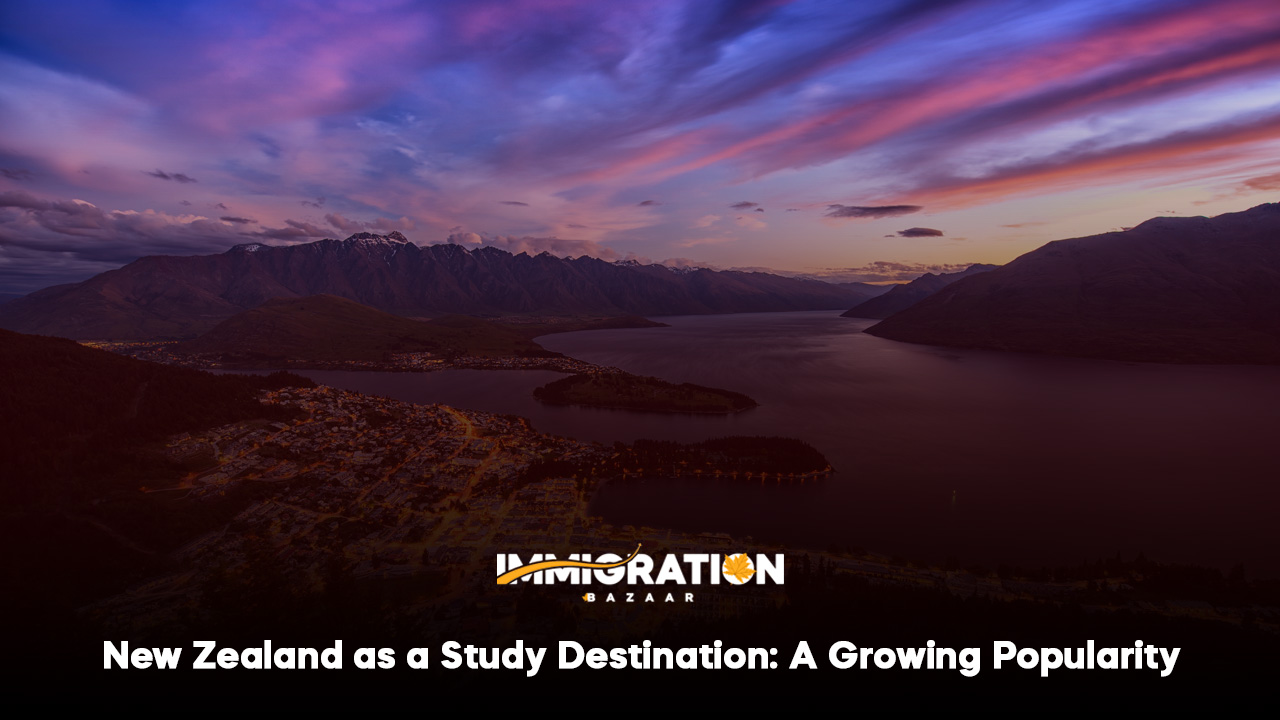Studying abroad has become an increasingly popular option for students seeking to gain a global perspective, enhance their career prospects, and immerse themselves in diverse cultures. Countries such as the United States, Canada, the United Kingdom, Australia, and New Zealand have long been top destinations for international students. Among them, New Zealand has been steadily gaining attention as a prime destination for higher education. Known for its high-quality universities, safe and welcoming environment, and scenic landscapes, New Zealand is emerging as a preferred choice for students from around the world, especially from India, China, Southeast Asia, and Europe.
In recent months, there have been significant updates related to student visa policies in New Zealand, particularly regarding an increase in the number of student visas issued, new processing statistics, and rising visa fees. These developments are likely to have a profound impact on students planning to study in the country in the coming years. This article will delve into the key aspects of New Zealand’s study abroad landscape, covering topics such as the growing popularity of New Zealand as a study destination, the latest updates on student visa policies, rising visa fees, and tips for international students looking to make New Zealand their academic home.
Over the past decade, New Zealand has positioned itself as a competitive destination for international students. While traditionally overshadowed by its neighbor Australia, New Zealand’s unique advantages have increasingly drawn students seeking high-quality education, research opportunities, and pathways to permanent residency.
Some of the factors contributing to New Zealand’s rising popularity as a study destination include:
-
Quality of Education
New Zealand boasts eight universities, all of which rank within the top 3% globally, according to the QS World University Rankings. Institutions such as the University of Auckland, Victoria University of Wellington, University of Otago, and the University of Canterbury are recognized for their research capabilities, academic rigor, and cutting-edge facilities. The country’s education system places a strong emphasis on critical thinking, innovation, and problem-solving, skills that are highly valued in the global job market.
In addition to universities, New Zealand also offers a range of polytechnics and private tertiary institutions that provide vocational training and specialized courses. These institutions often have strong ties to industries, making them a popular choice for students looking to gain practical skills and hands-on experience.
-
Safe and Welcoming Environment
New Zealand is consistently ranked as one of the safest countries in the world, making it an attractive option for international students and their families. The country’s multicultural society is known for being friendly, inclusive, and supportive of diversity. New Zealand’s strong student support services, both at the university and government levels, ensure that international students are well-integrated into the local community and receive assistance with academic, cultural, and personal challenges.
-
Pathways to Residency and Employment
One of the key advantages of studying in New Zealand is the opportunity to transition from a student visa to a work visa and, eventually, to permanent residency (PR). The country has relatively straightforward pathways for students who wish to stay and work after completing their studies. Graduates with qualifications in fields such as information technology, engineering, healthcare, and construction are particularly sought after, as these sectors are experiencing skill shortages.
The Post-Study Work Visa allows international students to stay in New Zealand for up to three years, depending on the level of their qualification, to gain work experience. This visa is often a stepping stone toward obtaining skilled migrant visas and, ultimately, permanent residency.
-
Stunning Natural Environment
New Zealand’s breathtaking natural landscapes, including mountains, forests, lakes, and beaches, provide a unique setting for students to study and relax. The country’s outdoor lifestyle and emphasis on environmental sustainability are attractive to students who value a balanced lifestyle and outdoor activities such as hiking, skiing, and surfing.
Recent Updates on Student Visas: Key Statistics and Trends
In a recent announcement, New Zealand revealed that it has significantly increased the number of student visas across several categories, reflecting the country’s strong commitment to attracting international students. According to the latest statistics, since August 2020, New Zealand has received a total of 1,24,000 applications for student visas. Of these, 1,19,000 applications have been processed, and 1,01,000 visas have been approved. These figures highlight a high success rate for student visa approvals, with over 85% of applicants receiving positive outcomes.
-
Streamlined Processing
The high number of processed and approved student visa applications reflects the New Zealand government’s efforts to streamline visa processing and reduce wait times. International students have often faced delays and backlogs in visa processing due to the global pandemic, but New Zealand’s immigration authorities have worked to address these issues. This is an encouraging sign for prospective students who are eager to start their academic journey in New Zealand without prolonged administrative delays.
-
Categories of Student Visas
New Zealand offers various types of student visas depending on the course duration and type of study. Some of the most common student visa categories include:
- Full-Fee Paying Student Visa: This visa is for international students who are enrolled in full-time courses at a New Zealand institution. It allows students to stay in New Zealand for the duration of their study and work part-time (up to 20 hours per week) during the academic year.
- Pathway Student Visa: This visa allows students to take up to three consecutive courses of study in New Zealand on a single visa, making it easier to transition between academic levels (e.g., from language courses to a degree program).
- Exchange Student Visa: For students participating in approved student exchange programs between New Zealand and other countries.
- English Language Study Visa: This visa is specifically for students enrolled in English language courses in New Zealand.
-
Rising Demand Post-Pandemic
The global COVID-19 pandemic had a significant impact on international student mobility, with border closures and travel restrictions severely limiting the flow of students to countries like New Zealand. However, with the easing of travel restrictions and New Zealand’s successful management of the pandemic, demand for student visas has surged. Many students who postponed their studies due to the pandemic are now resuming their plans to study abroad, contributing to the high number of visa applications.
This post-pandemic rebound is also reflective of the increasing importance of international education to New Zealand’s economy. The education sector is one of the country’s largest export industries, contributing billions of dollars annually to the economy through tuition fees, living expenses, and related services.
Visa Fee Increases: What Students Need to Know
While the increase in student visa approvals is good news for prospective students, there are also some important updates regarding visa fees. Beginning in October next year, the cost of applying for a student visa in New Zealand will rise significantly, from the current fee of $355 NZD to $750 NZD. This increase represents a more than twofold rise in visa application fees, which could affect students’ budgeting plans.
-
Reasons for the Fee Increase
The New Zealand government has cited several reasons for the hike in visa fees, including rising administrative costs, increased demand for visa processing services, and the need to maintain high-quality immigration services. Immigration New Zealand (INZ) has emphasized that the fee increase will help fund improvements in visa processing infrastructure, reduce processing times, and enhance customer service.
However, the substantial rise in fees has raised concerns among students and educational institutions. While New Zealand remains an attractive destination for international students, the increased cost of obtaining a student visa could deter some students, particularly those from developing countries, where financial constraints are more pronounced.
-
Impact on Other Visa Categories
In addition to student visas, fees for other visa categories are also set to increase. The fee for visitor visas, skilled migrant visas, and permanent residency (PR) applications will all rise, making it more expensive for international students to transition from study visas to work or residency visas after graduation. For example:
- Visitor Visas: These will see a modest fee increase, which may affect family members or friends visiting students in New Zealand.
- Skilled Migrant Visa: This visa, which allows international graduates to live and work in New Zealand long-term, will also see an increase in fees. This could impact students hoping to stay in the country after completing their studies and seeking employment.
- Permanent Residency (PR) Visas: For students aiming to make New Zealand their permanent home, the increase in PR visa fees could pose an additional financial burden.
Tips for International Students: Navigating New Zealand’s Education System
For students planning to study in New Zealand, understanding the visa process, fee structure, and available opportunities is essential for a successful experience. Here are some tips for navigating New Zealand’s education and immigration system:
-
Plan Ahead
Given the rising visa fees and potential delays in processing due to increased demand, students should plan their application process well in advance. Ensure that all required documents, including proof of enrollment, financial statements, and health clearances, are ready before applying for the visa.
-
Explore Scholarships and Financial Aid
To offset the increased costs of visa fees and tuition, students should explore scholarship opportunities offered by New Zealand institutions, government programs, and private organizations. Some universities in New Zealand offer specific scholarships for international students based on academic merit, leadership qualities, and financial need.
-
Understand Post-Study Work Opportunities
New Zealand offers excellent opportunities for international students to gain work experience after graduation through the Post-Study Work Visa. Make sure to research the specific requirements and timelines for applying for this visa, and understand how it can lead to further work or residency opportunities.
-
Be Aware of Health and Insurance Requirements
International students in New Zealand are required to have health insurance for the duration of their stay. Be sure to purchase comprehensive health insurance that covers medical emergencies, accidents, and other health-related issues.







